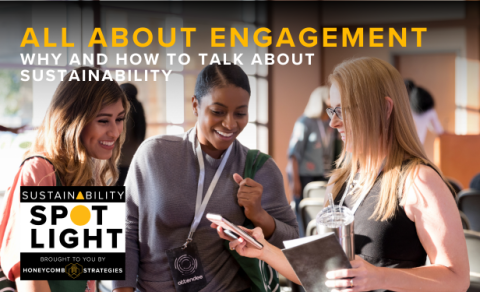A Successful ESG Strategy: All About Engagement

Exclusively sponsored by Honeycomb Strategies.
Effective engagement is the cornerstone of a successful environmental, social, and governance (ESG) strategy. Transparent and clear communication keeps your stakeholders informed, encourages participation, and evaluates progress to ensure that milestones are met. Let’s delve into why engaging with stakeholders matters to your sustainability strategy and how it directly impacts your bottom line.
Who should you engage with?
The best communication targets different stakeholder groups with custom outreach. Your engagement should be reactive to the needs of your audience and reflective of your event’s landscape. For example, if you receive a lot of feedback from attendees at your B2B conference about sustainability, prioritize these stakeholders with a public-facing strategy. When organizations need to build buy-in from staff, we recommend they invite people from disparate departments to participate in a Green Team that reports out to their colleagues. Build on your engagement yearly and add new stakeholder targets as your ESG programs grow.
What’s the best way to engage?
Again, be strategic with the best way to reach your target group. If trade show waste is a significant issue with your target exhibitors and their contractors, you may start pre-show by including sustainability guidance in the exhibitor services kit and newsletters. On site, include messaging in their welcome materials and via signage at the service desks. Post show, you could use a survey to receive feedback.
Engaging the public can be a multi-pronged approach, using digital media like your website and social media, and sprinkling sustainability into press releases, interviews, and media days. Don’t forget to give kudos to your partners and supporters! They’ll re-share and get name visibility as a benefit of their participation.
Tips for telling your story
If you’re just starting out with ESG, chances are you’re already doing some things that are sustainable or inclusive. Highlight familiar, existing programs and frame them through the lens of developing sustainability goals. Then, generate curiosity about new, unfamiliar programs and open channels for feedback.
We always recommend publishing a public-facing, executive-endorsed sustainability statement. It lends authority to your program, and also creates accountability to measure actions against your publicly stated values.
For engagement during the event, develop a Sustainability Hub to attract visitors to learn about your efforts. This activation can encourage visitors to participate in programs you’ve set up and educate them on best practice behaviors like using refillable water bottles, recycling their lanyards, and choosing plant-based meals.
Traps to look out for
As you craft your narrative, be careful not to exaggerate your progress, and certainly don’t make false claims, which we call “greenwashing.” Being realistic and open about your goals makes your organization trustworthy and reliable, which has benefits far beyond environmental impacts.
Don’t feel like you can’t share because you haven’t achieved a certain level of progress. Demonstrate the value of transparency! As Brené Brown says, “staying vulnerable is a risk we have to take if we want to experience connection.” Even in the corporate world, vulnerability is necessary to build relationships.
The benefits of engagement
Sustainability is a collaborative effort, and without buy-in, you can’t advance your programs to their fullest extent. Considering that many sustainability efforts center on reduction (e.g. paper use, giveaways, energy, water), the larger your buy-in, the bigger the cost savings.
Sustainability-focused publicity and accolades can bolster advertising spends organically, saving you money. Publicity can be a big incentive for supporters. By talking about programming, you’re building enough support to launch new programming and generating more opportunities to share progress, which in turn attracts more support… the cycle goes on and on!
The irony of the sustainability journey is that you have to be willing to share where you are to get where you want to go. Communicating your journey can foster stronger relationships with stakeholders, employees, and customers and translate to the bottom line. No matter if you’re a beginner or a pro, talking about the work is part of the work.
Honeycomb Strategies specializes in impactful solutions for sustainable events, sports, and venues. hcsustainability.com/ hello@hcsustainability.com


Add new comment